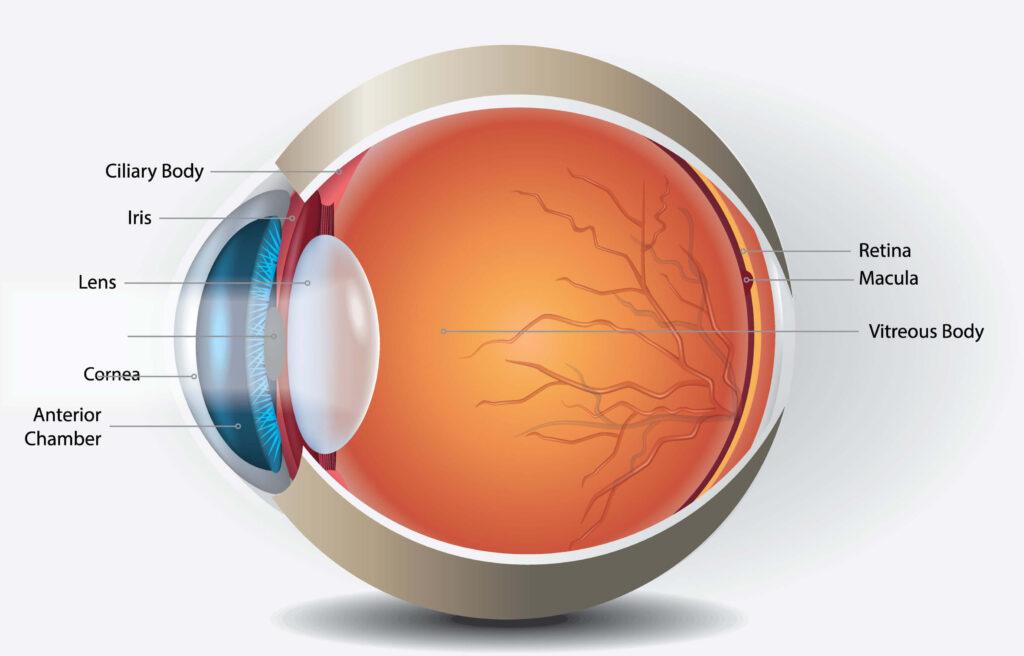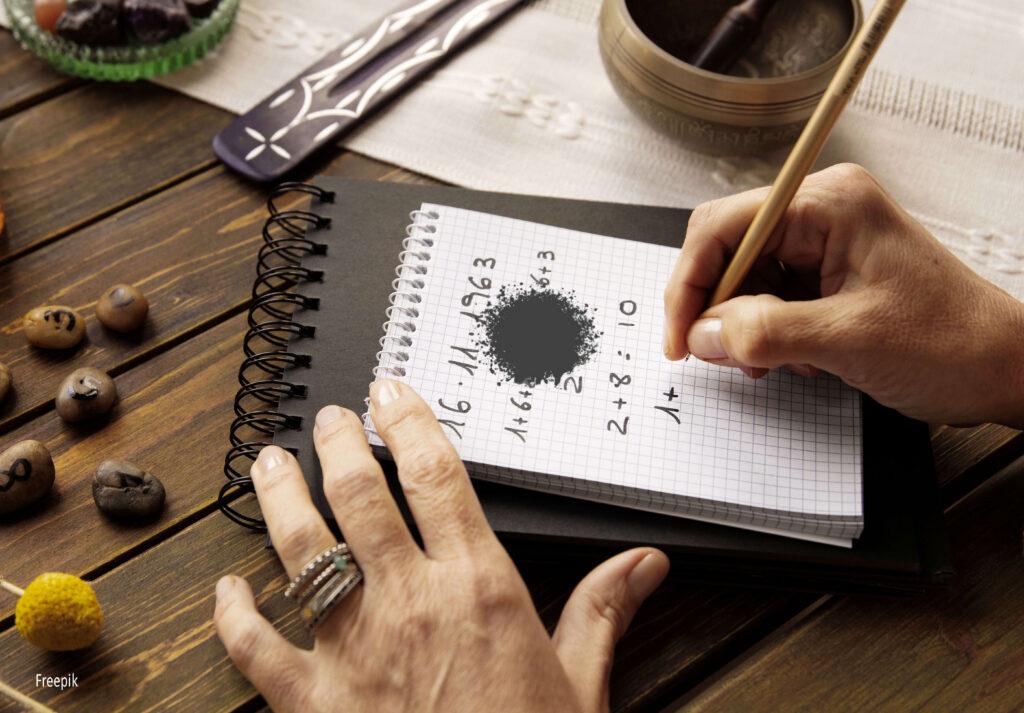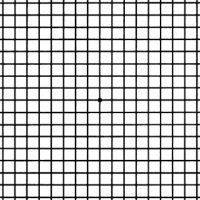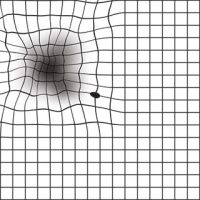Age-Related Macular Degeneration
Published: 14/09/2023
What is it?
Age-related macular degeneration (AMD) is an eye condition that causes a deterioration of central vision. As the name implies, it is caused when ageing causes damage to the macula (the part of the retina responsible for straight-ahead, sharp focus). AMD is one of the most common causes of vision loss for older adults and although it never causes complete blindness, it can make it harder to drive, see faces, read or do near-work.
AMD progresses slowly in some people and faster in others. It can also affect one or both eyes.

Types of AMD
There are 2 types of AMD, namely dry and wet.
Dry AMD is the more common type and about 80% of people with AMD have the dry form. Dry AMD occurs when parts of the macula get thinner and clumps of proteins, lipids and extracellular debris called drusen form there. A few, small drusen may not affect your vision at all but as they get bigger and more numerous, they may distort or dim your vision making it more difficult to see fine detail. Dry AMD is divided into three stages, depending on the severity if symptoms – early, intermediate or late – it generally progresses slowly but may advance to become wet AMD.
Wet AMD is less common but the more serious form. Wet AMD occurs when new, fragile vessels grow beneath the macula. These vessels may leak blood or other fluids, causing scarring at the macula which leads to blind spots and loss of central vision.
Symptoms of AMD
In the early stages of AMD, you may not even notice that it is affecting your vision, that is why it is important to have regular eye exams for early detection.
Symptoms may include:
- Worsening/less clear vision – you may have trouble reading small print, driving or recognising faces.
- Dark/blurry areas in the centre of your vision.
- Straight lines look wavy.
- Colours may look different.
- Difficulty seeing when going from bright light to low light.

Who is at Risk?
Experts aren’t 100% sure why some people develop AMD and others don’t but they believe that our genes and the environment play a role.
The risk for AMD increases as we get older with people over 55 year old being more likely to have AMD. The risk of developing AMD is also higher for people who:
- Have a family history of AMD
- Smoke
- Are Caucasian
- Have high blood pressure or high cholesterol.
- Have a diet high in Saturated fat.

Diagnosing AMD
When having your routine eye exam, you will have your retina examined for any signs of drusen.
An Amsler grid can be used to look for subtle signs of AMD. An Amsler grid is a pattern of straight horizontal and vertical lines with a dot in the middle. If, while looking at the central dot with one eye at a time, some of the lines are wavy, distorted or missing, that could be a sign of AMD.

This is how a person without AMD will see the Amsler grid

This is how a person without AMD might see the Amsler grid – blurry, wavy lines or dim areas.
If AMD is suspected, you will be referred to an ophthalmologist for further testing which could involve an “OCT” scan or a fluorescein angiogram (where dye is injected into your arm and photographs are taken of the eye to detect any abnormal or leaking vessels)
What can be done?
At the moment there is no cure for AMD but there are treatments that can slow the progression of the condition down with the aim of preserving vision. A balanced diet containing dark green, leafy greens, yellow fruits and vegetables, nuts and anti-oxidant rich fruits (like berries) has been shown to be beneficial for people with AMD.
Large studies by the National Eye Institute (the AREDS and later the AREDS2 studies) found a combination of vitamins that were shown to slow the progression of AMD. These are the amounts that should be taken daily:
- Vitamin C (500 mg)
- Vitamin E (400 IU)
- Lutein (10 mg)
- Zeaxanthin (2 mg)
- Zinc (80 mg)
- Copper (2 mg)
*Please note that some AMD supplements contain Beta carotene which should not be used by smokers as it has been shown to raise the risk of lung cancer.
The supplements have not been shown to prevent AMD so there’s no need to take them if you don’t have the condition.

Specifically for wet AMD, there are medications called anti-VEGF drugs (anti vascular endothelial growth factor). An ophthalmologist can deliver these to the eye using a very slender needle where they help to reduce the amount of new, abnormal blood vessels. If the injections aren’t helping, some surgeons also use laser therapy and photodynamic laser therapy to destroy the abnormal vessels.
There is exciting research into gene therapy which is investigating different ways on introducing the therapy into the eye which will encourage the eye to manufacture its own anti-VEGF. Stem cell research is also underway to find methods to replace retinal cells that begin to die with healthy new stem cells. For dry AMD, 2 immune therapy drugs are currently under investigation.
Takeaway
Macular degeneration does worsen over time but not everyone who has AMD will develop it in both eyes or progress to the late stages. Most people with AMD will maintain good eye sight and will never lose all their sight. With timely treatments and healthy lifestyle changes can go a long way to protect your valuable central vision.

References
- “Age-Related Macular Degeneration (AMD)” : NIH – National Eye Institute https://www.nei.nih.gov/learn-about-eye-health/eye-conditions-and-diseases/age-related-macular-degeneration#:~:text=Age%2Drelated%20macular%20degeneration%20(AMD)%20is%20an%20eye%20disease,the%20back%20of%20the%20eye).
- “What is Macular Degeneration?” : Kierstan Boyd; 6 April 2023
- “What is AMD?” : NHS UK; https://www.nhs.uk/conditions/age-related-macular-degeneration-amd/
- “Age-Related Macular Degeneration (AMD): Symptoms, Causes, Treatment.” : Dean Shaban; medically reviewed by Jabeen Begum MD; 15 June 2023
- “What Are Drusen?” : Daniel Porter; reviewed by Ninel Z Gregori MD on 26 April 2023
- “New Treatments for Age-Related Macular Degeneration.” : By Susanne Medeiros, Reena Mukamal; Reviewed by Rahul N Khurana MD, Sunir J Garg MD, Jayanth S Sridhar MD; 10 February 2023